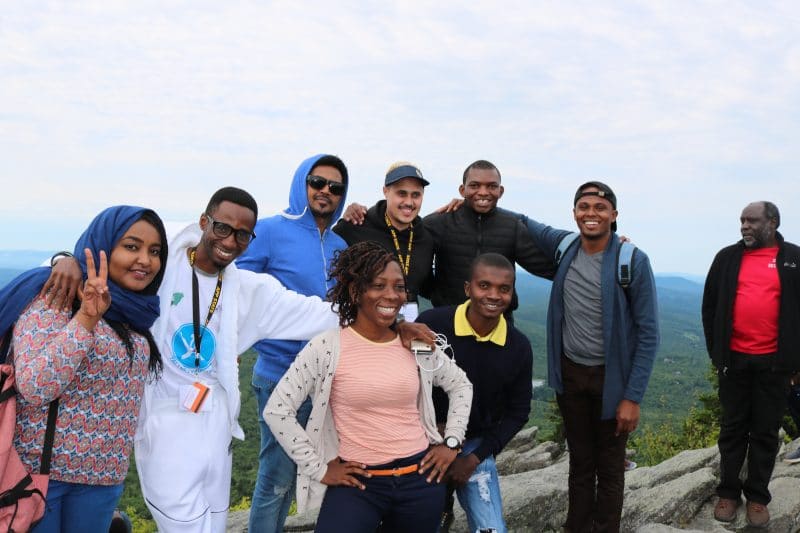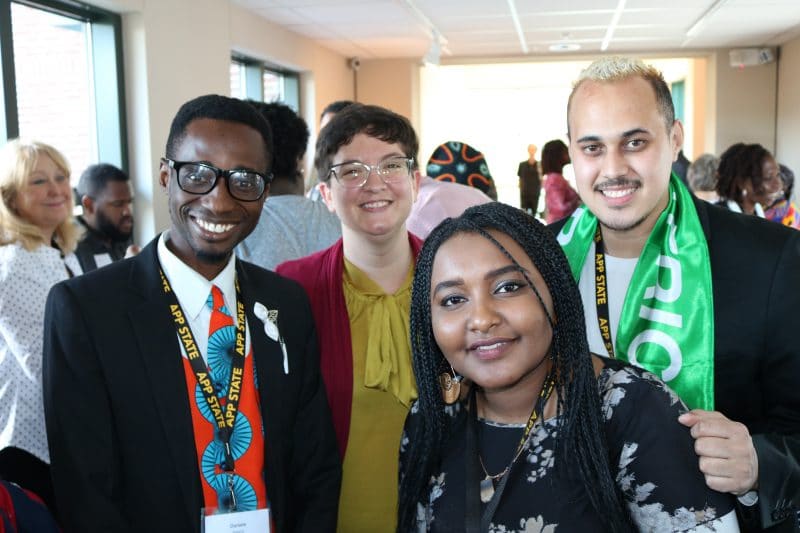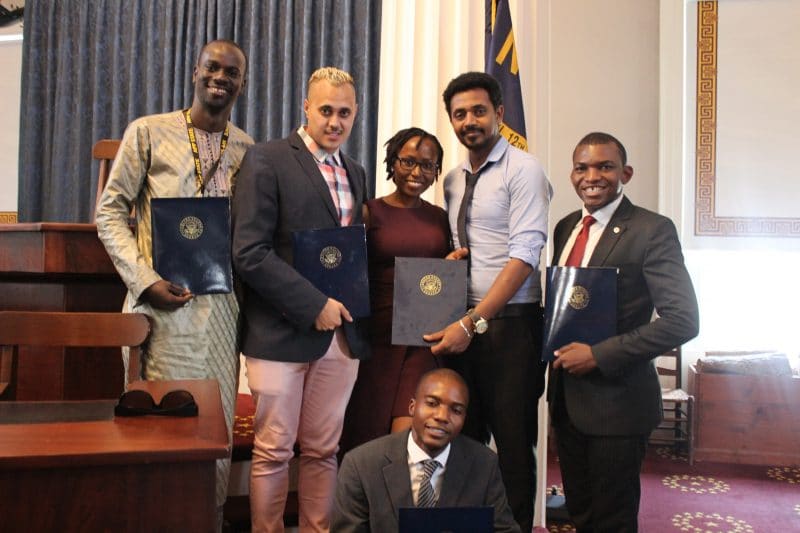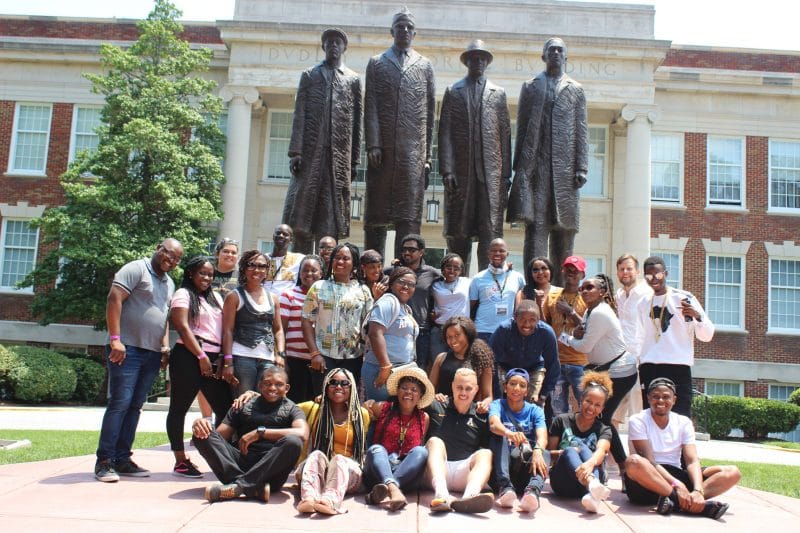
The Mandela Washington Fellowship for Young African Leaders empowers young Africans through academic sessions, networking opportunities, leadership training, and organized cultural activities. Each fellow takes part in a six-week Leadership Institute at a U.S. college or university in Business, Civic Engagement, or Public Management. Fellows also visit Washington, D.C., for a Summit featuring networking and panel discussions with U.S. leaders from the public, private, and non-profit sectors. After fellows return home, the program provides support for continued professional development.
We talked to Micheal Ludick, a current Mandela Washington Fellow from South Africa who is placed at the Appalachian State University in North Carolina. He told us more about the program and gave us some great application tips!
1. What inspired you to apply for the Mandela Washington Fellowship?
I wanted to encourage people in my community to follow their dreams. I grew up in Wrenchville near Kuruman in the Northern Cape, South Africa. Young people from my town live in poverty and we rarely see members of our community reach exceptional heights like the Mandela Washington Fellowship. They settle for ordinary jobs and few of them really reach international stages, if any at all. Thus, my first reason for applying was to show the youth of my community that you can do anything you set your mind to. Do not limit yourself by the limitations placed on you by others. It does not matter where you come from, if you work hard, you can reach the goals you set out for yourself. I want to be a role model, someone the younger people can look up to and say, “If he could do it why will I not be able to do it?” I want to show the youth that drug abuse is not the way to go and that you must believe in the beauty of your dreams.
Secondly, I am involved in Mental Health issues, especially suicide prevention, drug abuse and restorative justice and want to learn how to expand my impact. In 2017, a Grade 9 learner at the school I worked at committed suicide and I realized that I cannot be quiet about this problem anymore. We launched a suicide prevention and awareness campaign which reached more than 20,000 youngsters. This sparked something in me. I applied for the Mandela Washington Fellowship as a way to learn more about being a social entrepreneur. The skills and knowledge one can gain through this project will help me change the lives of many people when I get back to my country and will assist in registering my NGO, which will aim to address many social issues faced by people in the Northern Cape. I believe from here I can build my network and use the hype around the project to impact my city, province and country as a whole.
Finally, I applied for the Mandela Washington Fellowship to develop myself. Through this fellowship, they develop you as a leader and push you out of your comfort zone. They shift the paradigm you used to function in — and broaden the horizons of this boy from Wrencvhille! Furthermore, you learn so much from the other fellows who are from all over Africa. I applied to learn from others and become the best version of myself. I will use the skills to empower others and encourage others to be part of the project. My friend Mpho and I are the first two young people to represent the Northern Cape at the Mandela Washington Fellowship and this in itself is such a huge honor. The Mandela Washington Fellowship is the breeding ground for the next generation of young leaders in Africa and I am blessed to be part of the group.

2. What have you enjoyed most about the fellowship so far?
From the fellowship, I have learned that it is possible to change the lives of people and reach the goals and dreams I have. There are many young people in Africa who are taking great strides to change our continent for the better and being a part of the Mandela Washington Fellowship makes me one of these change-makers. I get inspired by the work my fellow brothers and sisters are doing. I enjoy hearing about the amazing work we all do and the stories we share from our experiences are teaching me how to be an effective leader and truly make a great impact back home. The lecturers and experts who lecture in our classes have taught me so much and the theory part of the fellowship is key to developing as a leader. Things like finding your strengths and learning to use them effectively have already changed the way I will lead when I go back to my country.
The mentorship relationships I build with CEOs and Lecturers from here will continually impact my life and continue to help me grow as a leader. There are many people in America that are volunteering at a lot of places and this is a lesson I want to take back to South Africa with me. The people organizing the Mandela Washington Fellowship at Appalachian State University are the best mentors and put so much effort and time into the project. They share parts of who they are and really push me to be the best version of myself. They make our fellowship experience unique by exposing us to things other fellowships do not and they do not just “talk the talk.” By observing people like Jesse, Brian and Melory – our mentors – you truly see that they live as servant leaders. I will strive to emulate them when I return home.
Secondly, the fellowship has thus far taught me that all people are facing hardships and even Americans have issues similar to Africa. We visit a lot of American-based civil society programs and projects. From these, I have learned new ideas and techniques I can use in my own work. As a social entrepreneur actively involved in mental health issues, I and believing that we can solve many of these mental health issues through not only counseling and restorative services but by also by focussing on education, which can as a way to help people them to break the cycle of poverty they find themselves in.
Thirdly, the Mandela Washington Fellowship has been a fun experience. The coordinators keep reminding us to have fun. I have been hiking, canoeing, bowling, dancing and have explored waterfalls, lakes and caves. We went to the international civil rights museum in Greensboro. We visited the state legislature in Raleigh where we were welcomed and acknowledged. We enjoyed the Fourth of July parade and fireworks. I was part of the Blackberry Parade in Lenor, North Carolina and honored by the mayor. I enjoyed a homestay experience in the U.S. All of these fun experiences will always stay in my mind because the Fellowship experience was not just learning a lot but also having so much fun. It is important that we strike the balance between work and play as leaders.

3. What tips do you have for others applying to the Mandela Washington Fellowship?
I am one of the lucky people who applied for the Mandela Washington Fellowship my first time and was accepted. My first tip is that you need to be honest in everything you write. Being honest will bring out who you are and people selecting fellows look for this authenticity. Do not try too hard to impress the selection panel – just share who you are and what you do. I believe that being authentic and real will convince them to select you.
Secondly, people applying need to have a clear message about what they do and what they want to achieve. Share your passions, hopes and dreams for the people around you and your country. Make sure the track you apply for relates to what you do. Civil leadership is for people in the nonprofit and non-government organization sector, business is for people with profit-making businesses and public management is for people in public leadership. Do not apply for the wrong track because you will not be accepted if you do.
Finally, you must have a proven track record as a leader if you apply. The Mandela Washington Fellowship is looking for leaders who are making an impact already. Therefore, you need to make sure you are actively involved in leadership activities in your country and able to prove this in your application. Otherwise, you will not be selected. Take time to grow at home before the fellowship because the fellowship is there to expand what you are already doing. Always remember to be the change you wish to see in this world. As Nelson Mandela said, “to be free is not merely to cast off one’s chains, but to live in a way that respects and enhances the freedom of others.”

Micheal Ludick was born and raised in the rural township of Wrenchville, Kuruman in the Northern Cape. He has more than 8 years of experience in the field of youth development, education, life coaching and motivational speaking. Currently, Micheal is a Departmental Head for Mathematics at Floors High School in Kimberley. Micheal holds a Bachelors of Arts degree and a Post Graduate Certificate in Education passed with distinction from the University of North West. Micheal is driven by his commitment to Youth Development, with the assistance of learners he works with he launched the first chapter of the International Yellow Ribbon Suicide Prevention Program in South Africa and it is the second chapter in Africa. Through this project, they reached more than 20,000 young people in South Africa and they received National acknowledgment as this program received the second position in the Youth Citizen Action Program (YCAP) for High Schools. After completion of the Mandela Washington Fellowship Micheal intends on starting a non-profit organization focused on suicide prevention and awareness and wants to see sites of the Yellow Ribbon Project launched all over South Africa.
Interested in applying? Bookmark the Mandela Washington Fellowship for Young African Leaders to your ProFellow account.
© Victoria Johnson 2019, all rights reserved